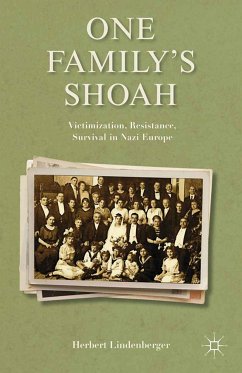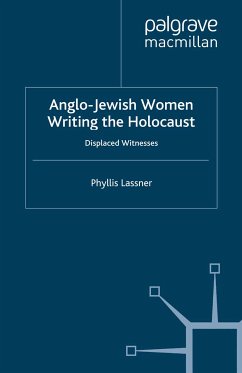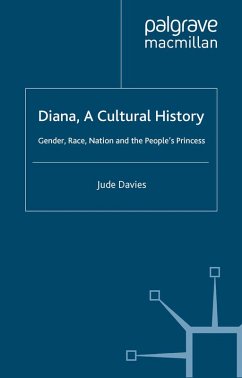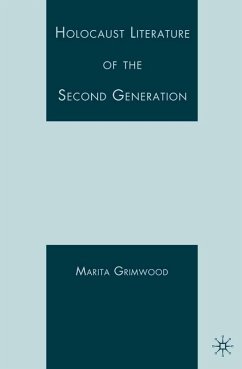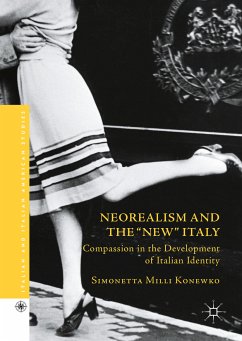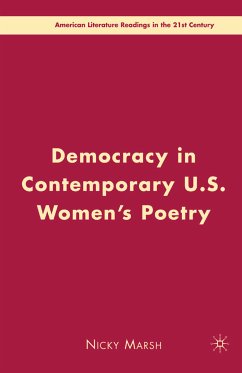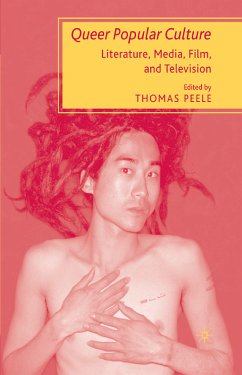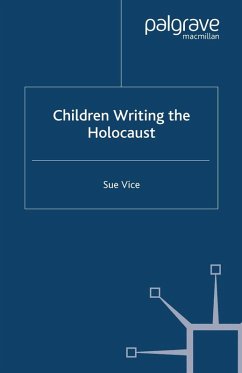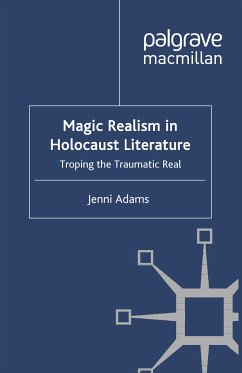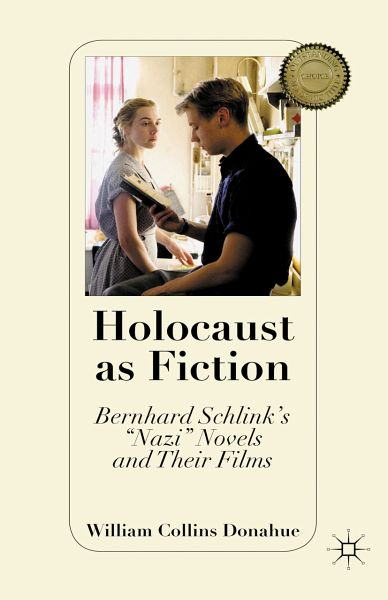
W. Donahue
eBook, PDF
Holocaust as Fiction (eBook, PDF)
Bernhard Schlink's "Nazi" Novels and Their Films

PAYBACK Punkte
34 °P sammeln!






Holocaust as Fiction seeks to explain and critically evaluate the extraordinary success of Schlink's internationally acclaimed novel, The Reader , the widely read "Selb" detective trilogy, and two popular films based closely on his work.
Dieser Download kann aus rechtlichen Gründen nur mit Rechnungsadresse in A, B, BG, CY, CZ, D, DK, EW, E, FIN, F, GR, HR, H, IRL, I, LT, L, LR, M, NL, PL, P, R, S, SLO, SK ausgeliefert werden.
William Collins Donahue is Professor and Chair of Germanic Languages at Duke University, USA.
Produktdetails
- Verlag: Palgrave Macmillan US
- Seitenzahl: 251
- Erscheinungstermin: 19. Januar 2011
- Englisch
- ISBN-13: 9780230115460
- Artikelnr.: 46752696
"Much has been written about Schlink's 'Nazi' novels - the trilogy featuring Nazi-judge-turned-detective Gerhard Selb and the internationally famous The Reader, particularly the latter and its film version (2008) - but no one has written more discerningly about it than Donahue. His scholarship is thorough and his critique is unrelenting. Summing Up: Essential.' - Choice
"Holocaust as Fiction is, to this reviewer's knowledge, currently the most sophisticated work of English-language scholarship in existence on "the Schlink phenomenon" and should be required reading on the topic." - German Studies Review
"William Donahue's Holocaust as Fiction probes one of the most provocative phenomena of Holocaust remembrance at the turn
"Holocaust as Fiction is, to this reviewer's knowledge, currently the most sophisticated work of English-language scholarship in existence on "the Schlink phenomenon" and should be required reading on the topic." - German Studies Review
"William Donahue's Holocaust as Fiction probes one of the most provocative phenomena of Holocaust remembrance at the turn
Mehr anzeigen
of the millennium - Bernhard Schlink's 1995 bestseller Der Vorleser (The Reader), followed by its popular 2008 film adaptation - in all its complexity. Central to Donahue's analysis is his attention to The Reader not merely as a popular book or film, but as a site of extensive public discussion and cultural engagement, ranging from earnest pedagogical protocols to contentious critical debates. With incisive and lively prose, Donahue guides his readers through the evolution of Schlink's literary approach to postwar Germany's reconciliation with the Nazi past; the reception of the author, his fiction, and its adaptation for the screen; and, most importantly, the problematic establishment of The Reader as a landmark of Germany's evolvingengagement with the Nazi era and the Holocaust. In analyzing a literary work that proves to be deceptively facile, Donahue brings carefully nuanced attention to the many facets of the Vorleser phenomenon, explaining the various responses the novel has engendered as revealing, if sometimes disturbing, cultural enterprises in their own right. Beyond its essential value for those who have read, taught, or argued over Schlink's work, Holocaust as Fiction is an important case study in the challenges of Holocaust remembrance both in Germany and America." - Jeffrey Shandler, author of While America Watches: Televising the Holocaust
"Lucid, comprehensive and thought-provoking, Holocaust as Fiction is both a critical study of one of the most disputed authors of postwar German literature, and an incisive reflection on the place of the Holocaust in the Western cultural imagination. Anyone interested in the place of modern, manmade catastrophes in contemporary culture will greatly benefit from reading this original, insightful book." - Amir Eshel, Charles Michael Chair in Jewish History and Culture, Stanford University, USA
"This book represents the first scholarly study to probe the 'Schlink phenomenon' and analyze its profound role in coming to terms with the Holocaust. Through deliberate and compelling analyses of Schlink's novels (and their adaptation in film), Donahue dissects the seductive, transnational appeal of his work and the ways in which popular culture more generally has contributed to the success of Germany's normalization campaign. A must read for anyone seriously interested in Holocaust studies." - Todd Samuel Presner, Professor of Germanic Languages and Comparative Literature, Director of the Center for Jewish Studies, University of California Los Angeles, USA
"William Collins Donahue's Holocaust as Fiction is the most comprehensive study of Bernard Schlink's world-famous novel and the resulting blockbuster film. It is solid, intelligent, and strongly argued. It reflects the critical literature on NS imagery in our time ably and provides the reader with clear and detailed interpretations of both the novel and film as well as their cultural contexts from contemproary Germany to Hollywood.' - Sander Gilman, Distinguished Professor of the Liberal Arts and Sciences, Professor of Psychiatry, Emory University, USA
"This study is valuable for anyone teaching or considering teaching Der Vorleser. With English translations throughout, it is widely accessible to a broad audience. Finally, it represents the first significant investigation into the 'Schlink phenomenon' and therefore makes an important contribution to research that continues to grapple with the legacy of the Holocaust in contemporary German - and American - culture." - Women in German Newsletter
"Holocaust as Fiction is . . . currently the most sophisticated work of English-language scholarship in existence on 'the Schlink phenomenon' and should be required reading on the topic." - Daniel H. Magilow, The University of Tennessee, Knoxville, USA
"Lucid, comprehensive and thought-provoking, Holocaust as Fiction is both a critical study of one of the most disputed authors of postwar German literature, and an incisive reflection on the place of the Holocaust in the Western cultural imagination. Anyone interested in the place of modern, manmade catastrophes in contemporary culture will greatly benefit from reading this original, insightful book." - Amir Eshel, Charles Michael Chair in Jewish History and Culture, Stanford University, USA
"This book represents the first scholarly study to probe the 'Schlink phenomenon' and analyze its profound role in coming to terms with the Holocaust. Through deliberate and compelling analyses of Schlink's novels (and their adaptation in film), Donahue dissects the seductive, transnational appeal of his work and the ways in which popular culture more generally has contributed to the success of Germany's normalization campaign. A must read for anyone seriously interested in Holocaust studies." - Todd Samuel Presner, Professor of Germanic Languages and Comparative Literature, Director of the Center for Jewish Studies, University of California Los Angeles, USA
"William Collins Donahue's Holocaust as Fiction is the most comprehensive study of Bernard Schlink's world-famous novel and the resulting blockbuster film. It is solid, intelligent, and strongly argued. It reflects the critical literature on NS imagery in our time ably and provides the reader with clear and detailed interpretations of both the novel and film as well as their cultural contexts from contemproary Germany to Hollywood.' - Sander Gilman, Distinguished Professor of the Liberal Arts and Sciences, Professor of Psychiatry, Emory University, USA
"This study is valuable for anyone teaching or considering teaching Der Vorleser. With English translations throughout, it is widely accessible to a broad audience. Finally, it represents the first significant investigation into the 'Schlink phenomenon' and therefore makes an important contribution to research that continues to grapple with the legacy of the Holocaust in contemporary German - and American - culture." - Women in German Newsletter
"Holocaust as Fiction is . . . currently the most sophisticated work of English-language scholarship in existence on 'the Schlink phenomenon' and should be required reading on the topic." - Daniel H. Magilow, The University of Tennessee, Knoxville, USA
Schließen
Für dieses Produkt wurde noch keine Bewertung abgegeben. Wir würden uns sehr freuen, wenn du die erste Bewertung schreibst!
Eine Bewertung schreiben
Eine Bewertung schreiben
Andere Kunden interessierten sich für


